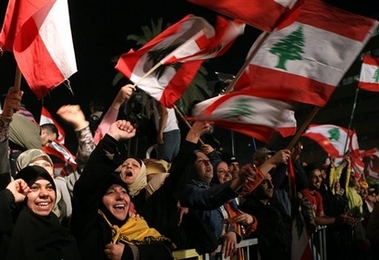 AP, Dec 4, 2006 Nearly two months after the rest of its army left southern Lebanon, Israel agreed yesterday to pull its few dozen remaining soldiers from the Lebanese part of a village divided by the border, yielding control to U.N. peacekeepers. The move came as Israel’s Cabinet discussed the three-day-old siege of Lebanese Prime Minister Fouad Siniora’s government by pro-Hezbollah demonstrators in Beirut. Commentators here called the troop pullout a diplomatic gesture aimed at shoring up Siniora’s position, but some said it would be of little help.
AP, Dec 4, 2006 Nearly two months after the rest of its army left southern Lebanon, Israel agreed yesterday to pull its few dozen remaining soldiers from the Lebanese part of a village divided by the border, yielding control to U.N. peacekeepers. The move came as Israel’s Cabinet discussed the three-day-old siege of Lebanese Prime Minister Fouad Siniora’s government by pro-Hezbollah demonstrators in Beirut. Commentators here called the troop pullout a diplomatic gesture aimed at shoring up Siniora’s position, but some said it would be of little help.
Israeli officials are alarmed by the crisis in Lebanon, fearing that a collapse of the moderate regime could bring to power an Iranian proxy state on Israel’s northern border and lead to another war like the inconclusive 34-day conflict last summer with Hezbollah.
The pullback of troops to the Israeli side of the border-straddling village of Ghajar was ordered by Israeli Prime Minister Ehud Olmert and senior officials but not formally announced, apparently out of concern that an overt Israeli effort to influence events in Beirut might backfire.
The decision was leaked to reporters by an Israeli official, who described it as the result of weeks of talks between Israel and the United Nations and an interim step in ongoing negotiations over the village’s ultimate status. The official, who spoke on condition of anonymity, said Israeli troops would be gone within days.
Ghajar’s 2,500 residents, most from the Alawite sect, hold Israeli citizenship. The village passed from Syrian to Israeli control when Israel conquered the nearby Golan Heights in the Arab-Israeli war of 1967.
With Israel’s invasion of Lebanon in 1978, the village began growing northward into Lebanese territory. After Israel withdrew from Lebanon in 2000, the two countries ended up dividing the village by a fence along the border, with crossing points for residents. Those on the Lebanese side still hold Israeli identification cards and receive Israeli state services.
After crossing the border to fight the Hezbollah militia last summer, Israel built a fence separating Ghajar from the rest of Lebanon and posted troops within the Lebanese section of the village, a move the Israelis said was aimed at closing off a potential Hezbollah infiltration route.
Lebanese officials said the Israeli soldiers’ continued presence on Lebanese soil was a violation of U.N. Resolution 1701, which settled the summer war. Hezbollah often refers to the Israeli presence to justify its belligerence toward the Jewish state.
Under yesterday’s accord, the U.N. peacekeeping force sent to monitor the border after the war will control access to the village from Lebanon and be responsible for the safety of Israelis who deliver such public services as garbage collection, road maintenance and utility lines.
A final resolution is expected to split the village definitively into Lebanese- and Israeli-administered municipalities, after allowing residents to choose which side to live on.
Aside from the diplomatic move, Israeli officials and commentators said yesterday there was little they could do for the embattled Lebanese leader.
"Anything appearing as a positive gesture from Israel to Siniora and Lebanon will only worsen the situation," said Aharon Zeevi-Farkash, former head of military intelligence, told Israel’s Army Radio. He said he was worried about a new Lebanon war.
"I have no doubt that if this [Lebanese] government loses its power," he said, "we are headed toward an escalation in the north starting from the spring or summer of 2007."



